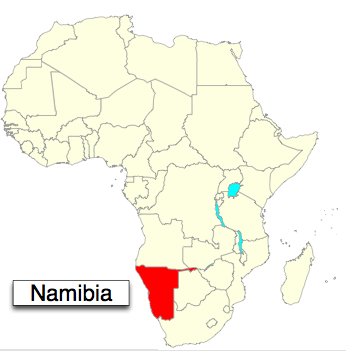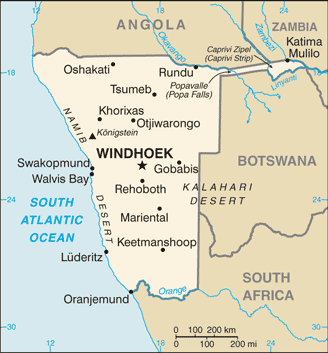“I will totally destroy you.”
Monday, December 8th, 2008Hey kids,
Just a small shout-out to say that I’m still doing well. Work is going well; I’ve been given the leeway to pursue my ideas for the improvement of Educational Statistics in Namibia, and I think my teammates and I will really be making a difference in our terms here. Basically our goal is to expand the capacity and functions of the current Educational Statistics department in the Ministry of Education. Right now, they collect a lot of data and put the results in a book and distribute that at the end of each year, one book to each school. That book inevitably disappears into the principal’s office, and most people I’ve talked to have no idea that Namibia even has an Educational Statistics department. So first, we’re going to make examination results for schools available online, and we’re going to add to that some analysis, including resources available at schools, teachers’ qualifications (in an aggregated form), and learners’ living situations. And we’re going to make it easy to compare two schools, overall and by subject. My personal goal is for village people to compare two neighborhood schools, realize that their children are going to the school producing learners with lower grades, and then apply pressure to the principal. This might not happen for five years, but it’s a nice dream.
One great thing that happened over the last week is that I found a great town house to rent for the next year at least. (This means that I don’t need to bike around town all weekend looking for places any more, or call housing agents who say “That place is already taken”.) The place is beyond anything I hoped I could afford (I took an 80% salary cut upon taking this job), and I am very happy to have found it. It’s got three bedrooms, 2½ bathrooms, kitchen, living room, and a dining room. There’s a balcony upstairs available from 2 of the bedrooms, and a patio outside in the backyard.
This is quite a step up from what I’m currently living in, and indeed what I even want to live in. By living in such a nice place, it’s obviously in a good neighborhood, and so the people who I could really enjoy sharing time and culture with are not living around there. Most people in this nice neighborhood tend to stick to themselves. It actually was a very difficult decision to make; but the size of the place won me over. Why? 2 reasons: 1. YOU can stay with me, comfortably and not on the floor, when you come to visit! 2. Ping-pong table in the dining room? Yes.
Which brings us to the most important point of this post. At my previous job at WeBuildPages, I played ping-pong almost daily. It developed friendships, it got the blood flowing in the middle of a brain-crunching muscle-atrophying computer programming day, and it provided for excitement and friendly competion. So since I’ve been back in Namibia, I’ve been suffering from ping-pong withdrawal. I have been asking many people if they know where I can play, and most people don’t even know what it is. Some people know what it is, but have no idea where it can be played. Finally I’ve found some fellow ping-pong players who play in a league, but unfortunately the league doesn’t start up again until after the New Year, and somehow the ping-pong tables “aren’t available” until that time. So I’ve been dreaming of just going and buying a table, but until I found this large apartment, I’ve had no place to put it.
You can imagine my surprise, then, after telling my boss that I’ve been really missing ping-pong, and that I’m going to buy a table, and asking him if he knew what it was, that the first thing he said was “I will totally destroy you.” Turns out he played a heck of a lot of ping-pong during his years studying in Australia (the land of the speed-cameras… be careful!), and he’s got the talk to match. I’m totally pumped to get this town house and table ready for service! But I’ll bet he’s never faced a serve like mine!
To wrap things up, I wanted to show you some pics of the food I’ve been cooking for myself, using the professional guidance I’ve received while studying under the Browns for a wonderful year.






 Upon my second return to village life in Namibia, my involvement with a local girl, indeed my girlfriend, has become part of the town gossip. Sometimes we walk together in town, but the give away is when villagers see me walking the 3 hours to her house. “White man, where are you going?” they ask. “I’m going to visit my friend.” “How far is it?” “I’m going to Onakankuzi.” “Oh, you’re going to visit Helena?!” “Yes, indeed.” “That’s good that you have that with her.” [Note: since relationshis are slightly repressed, using direct words to describe them are also frowned upon. A question like “Did you have sex?” could typically be asked as “Did you do something?” or by the more modern, “Did you use a condom?”]
Upon my second return to village life in Namibia, my involvement with a local girl, indeed my girlfriend, has become part of the town gossip. Sometimes we walk together in town, but the give away is when villagers see me walking the 3 hours to her house. “White man, where are you going?” they ask. “I’m going to visit my friend.” “How far is it?” “I’m going to Onakankuzi.” “Oh, you’re going to visit Helena?!” “Yes, indeed.” “That’s good that you have that with her.” [Note: since relationshis are slightly repressed, using direct words to describe them are also frowned upon. A question like “Did you have sex?” could typically be asked as “Did you do something?” or by the more modern, “Did you use a condom?”] I’ll miss the eager salespeople who walk through lines of cars in traffic with goods on their heads – anything could be there – water in bags, ice cream long since melted, meat pies, shower sponges, leather belts, Tampico (like Sunny D), sunglasses, basically whatever’s fresh off the cargo ships that month. I’ll miss all the good people I met, and I thank them for sharing their culture and time with me.
I’ll miss the eager salespeople who walk through lines of cars in traffic with goods on their heads – anything could be there – water in bags, ice cream long since melted, meat pies, shower sponges, leather belts, Tampico (like Sunny D), sunglasses, basically whatever’s fresh off the cargo ships that month. I’ll miss all the good people I met, and I thank them for sharing their culture and time with me. To top it all, I met the cousin of the harbourmaster of the major port town in Ghana (Tema), and he assured me we could work something out, and then he disappeared. My boat has left without me.
To top it all, I met the cousin of the harbourmaster of the major port town in Ghana (Tema), and he assured me we could work something out, and then he disappeared. My boat has left without me. Seth came out and we had our reunion greetings. We got in his car and left. First stop – the DCM’s home (Deputy Chief of Mission, the guy immediately under the Ambassador). Far from thinking himself too important to mingle with underlings, Jack was a very friendly guy! We went to use his air compressor to pump up Seth’s tires for a couple days of driving, and we ended up spending a few hours just drinking a few beers and chatting how the family structures in Africa don’t lend themselves to capitalism. He also had a few tips on where to visit the next day, and provided what is becoming his specialty – a hand-drawn map of things to see while we were up there. Two other embassy guys came over around 7, and we all went out to dinner at a German restaurant that had excellent Weinerschnitzel (sp?) and great wheat beer. That stuff’s hard to find in these parts.
Seth came out and we had our reunion greetings. We got in his car and left. First stop – the DCM’s home (Deputy Chief of Mission, the guy immediately under the Ambassador). Far from thinking himself too important to mingle with underlings, Jack was a very friendly guy! We went to use his air compressor to pump up Seth’s tires for a couple days of driving, and we ended up spending a few hours just drinking a few beers and chatting how the family structures in Africa don’t lend themselves to capitalism. He also had a few tips on where to visit the next day, and provided what is becoming his specialty – a hand-drawn map of things to see while we were up there. Two other embassy guys came over around 7, and we all went out to dinner at a German restaurant that had excellent Weinerschnitzel (sp?) and great wheat beer. That stuff’s hard to find in these parts. After dinner, we went to Seth’s house (provided by the Gov’t), and crashed. The next day, I got to see the generosity of the US Government to its foreign service staff. They’ve provided Seth with a beautiful and large house in which to stay, full of American appliances and things that made it more like home. When you’re inside, you have no idea that you’re still in a developing country.
After dinner, we went to Seth’s house (provided by the Gov’t), and crashed. The next day, I got to see the generosity of the US Government to its foreign service staff. They’ve provided Seth with a beautiful and large house in which to stay, full of American appliances and things that made it more like home. When you’re inside, you have no idea that you’re still in a developing country. He has satellite TV that gets AFN (Armed Forces Network) which is a series of channels that shows all the up-to-date American shows we get at home. A massive generator automatically kicks in 15 seconds after the power cuts out (which happens often), and a good-sized backyard is ready for picnics and football.
He has satellite TV that gets AFN (Armed Forces Network) which is a series of channels that shows all the up-to-date American shows we get at home. A massive generator automatically kicks in 15 seconds after the power cuts out (which happens often), and a good-sized backyard is ready for picnics and football. It wasn’t too high, but it was a beautiful area, and anyone used to a dry climate would have loved it. The top was nice and green, with a cellphone tower (
It wasn’t too high, but it was a beautiful area, and anyone used to a dry climate would have loved it. The top was nice and green, with a cellphone tower (